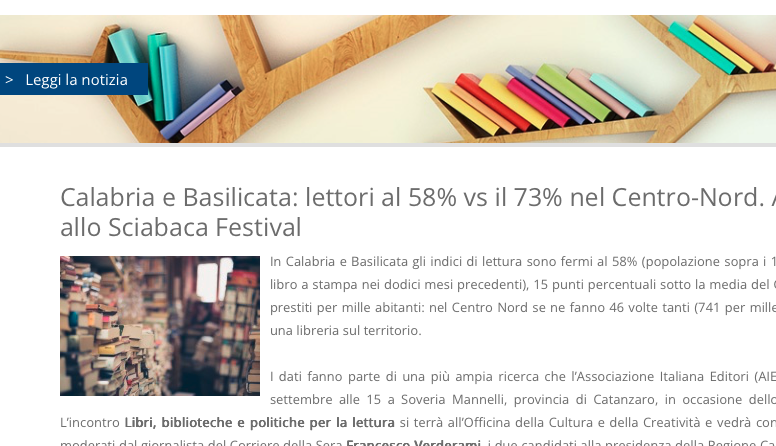Many years ago, I was fortunate enough to participate in a meeting in Trento organised by the AIE, as part of a transnational project funded by the European Union. I have never forgotten, and am still grateful to my friend Piero Attanasio for bringing it to my attention, a study developed by Professors Scorcu and Gaffeo. This work was a longitudinal study – covering many decades – which correlated the historical evolution of literacy rates in each Italian region with per capita income levels in those parts of Italy. When I finally got around to reading this study, I found it very inspiring.
When the AIE press release was published, I looked again for that report by the cited researchers and found two passages that I had underlined in their text.
On the one hand, its conclusions stated that “Traditional measures of human capital and reading indices help define the characteristics of the economic growth process. An empirical application to the case of Italian regions based on Barro’s regression estimation confirms the role of reading as a development factor and offers quantitative indications of its importance.” And the second quote I noted was that “It is known that reading includes among its determinants the level of income, which, in turn, is the outcome of the process of economic growth. However, the opposite causal link emerges, which is empirically relevant, by which the accumulation of knowledge (also through reading) can be identified as the main driver of economic growth and the level of income achieved by society.”
The comparison between northern and southern Italy has a long tradition, as does the one that has been made for two centuries between northern and southern Europe as a whole. An example of how this has been a matter of interest to various authors is Max Weber’s famous book on the development of capitalism.
I declare myself unable to refute or corroborate Max Weber’s theory, which we studied at my university, that the Calvinist ethic of austerity and discipline drove capitalism, industrialization, and wealth creation. However, what I find most interesting is to assess another of the constitutive elements of Protestantism: the priority that Martin Luther established that every believer should be competent to read the Bible. It is interesting to note that Protestant countries experienced processes that were not nearly as significant in Catholic countries:
- The flourishing of different branches of scientific research.
- Ideological and spiritual diversification manifested in the emergence of a multitude of religious sects and the formation of various political movements that progressively demanded spaces for discussion, culminating in parliaments finding the means to impact people’s lives.
- An economic model based on industrialization developed.
I am convinced that reading is an important key in these three lines of evolution, which in Catholic countries – where reading was still a certain monopoly of a few learned minorities – did not begin until the period after the French Revolution and the Napoleonic invasions.
It seems interesting to at least consider that reading proved to be a fundamental factor in the clear economic advancement of Protestant countries compared to Catholic ones.
I would love to learn about the Confucian theories and Korean cultural legacies which may have historically emphasized education, moral self-cultivation, and respect for scholars, creating a strong societal value placed on reading. These cultural and historical factors help explain why reading rates in Korea are higher compared to countries without a similar Confucian legacy.
I don’t think it’s a bad idea to insist on linking a country’s reading rates to its potential as a driver of the economic growth when we speak with politicians and the media.

